This article was co-authored by Arda Ozdemir, MA. Arda Ozdemir is the Executive Coach and Founder of Rise 2 Realize, a nonprofit organization in Palo Alto, California that is dedicated to providing a practical roadmap toward one's full potential in their life and career. Arda is a Reiki Master, an Emotional Freedom Technique Practitioner, and a certified HeartMath Trainer and Mentor.
There are 8 references cited in this article, which can be found at the bottom of the page.
This article has been viewed 174,859 times.
Everyone makes mistakes sometimes, but making a big mistake can be really upsetting. You might feel angry, embarrassed, sad, or just plain frustrated! No matter how you are feeling, it is important to calm down and start to work through your emotions so that you can move past your mistake. There are several strategies that may help you to do this.
Steps
Taking a Pause
-
1Pause for a few hours. After realizing that you have messed up something important, don’t take any immediate action. Your emotions will be running high. Your mind will probably be racing. Your heart may even be pounding. Refrain from making any big decisions or taking actions that you might regret later.[1]
- You probably feel like you need to start working on damage control immediately, but resist the urge.
-
2Find a quiet, solitary place. The last thing you need is noise, excitement, and unwanted social interaction. Try going into a bedroom, a private office, or a basement and shutting the door. Consider turning off your phone and shutting down your computer. All of this will reduce the risk of taking impulsive, ill-advised actions.Advertisement
-
3Focus on your breathing. After messing up something important, you will probably be taking short, shallow, and unconscious breaths from your chest. Try to change this. Focus on taking long, deep, conscious breaths from your diaphragm and abdomen. In practice, this feels like you are breathing from your stomach rather than your throat.[2]
- Concentrating on deep breathing will reduce your stress level, slow your heart-rate, and provide more oxygen to your system.
- People have been using this type of breathing for thousands of years through yoga and meditation, and it is scientifically proven to help manage stress and anxiety.
-
4Try to achieve mindfulness. Don’t allow your thoughts to keep going back to what you messed up. Stop your mind from racing towards the future consequences of your mistake. Achieving mindfulness means focusing on the present, your immediate surroundings, and your body. Become aware of your own sounds, the temperature, and what you smell or feel. Doing so will help you to relax. [3]
Working Through Your Emotions
-
1Express anger in a calm way. Allowing yourself to act out your anger by screaming, hitting things, or acting in other aggressive ways may actually make you feel even angrier. Instead, try to calm yourself down and express your anger in a non-aggressive way.[4]
- Try writing about your anger in a journal or call a friend and explain what happened and how it made you feel.
-
2Cry if you feel like it. Crying is a natural process and it releases stress hormones and toxins from the body. After letting out those tears, you may feel much more level-headed about the situation.[5]
- Remember that crying is not a sign of weakness but a psychological and biochemical process common to humans.
-
3Laugh it off. Mistakes are often embarrassing and one of the best ways to deal with embarrassment is to laugh it off. Try to think about something funny about what happened and allow yourself to laugh at it.
- For example, if you bombed a presentation, try to laugh at how strange it must have looked when you could not decide if you should sit down or stand up.
-
4Make a list of what went wrong and try to develop solutions. List-making can be a powerful tool for overcoming anxiety. If you are feeling anxious about what happened, then write down everything that you think went wrong. This list may help you to process your feelings about the mistake and develop solutions going forward.[6]
- For example, if you think that you did poorly on a test, then making a list of the questions that gave you trouble may help you to develop a new study strategy for the next test. You might also identify some things that you can do to minimize the effects of the test on your grade, such as asking your teacher about extra credit.
-
5Try not to beat yourself up. While it is important to acknowledge that you made a mistake so you can learn from it, it is also important to forgive yourself so that you can move on. Working through your emotions involves recognizing that you are only human. No matter how bad the screw up, you need to accept that you made a mistake and that everyone makes mistakes sometimes.
- Many people find that repeating a mantra is a helpful way of silencing negative or hateful self-messages.
- For example, trying repeating the phrase “I am only human, I am doing the best that I can, and that is all I can do.”[7]
Moving Forward
-
1Put things into perspective. Even if you made a huge mistake, remember that everything is temporary. You might feel terrible right now, but this feeling will not last forever. Try to keep reminding yourself that the way you feel is only temporary and that should help you start to move forward.[8]
-
2Reach out to your friends and family for support. Almost everyone has had the experience of messing up something important. In fact, someone you know may have messed up something even worse, and this might put your own problem into perspective. Even if their experiences are different from yours, it will help just to talk, vent, and get things off your chest.[9]
- If you are having trouble getting friends and family to listen, or if you’re unhappy with their responses to your problem, consider talking with a counsellor or therapist.
-
3Apologize if necessary. In some situations, making a mistake may affect others, so you may need to apologize and it is best to make your apology right away. Think about whether your mistake was something that might have hurt someone else. If so, then prepare to apologize to that person.
- Try saying something like, “I am sorry for what I did. I realize that my actions affected you as well and I feel really bad about that. Can you forgive me?”
-
4Forgive yourself. Holding resentment against yourself will not make it easy to move forward either, so you will need to forgive yourself for what happened. You may find it hard to forgive yourself, but it should become easier with time.[10]
- Try writing yourself a letter that expresses understanding about what happened. Imagine that you are writing to yourself as a friend and be kind to yourself in the letter.
- Repeat “I forgive myself” as you go through your day. The more you say it, the easier it may be to believe it.
-
5Make a new plan. You may have messed up option X, but keep in mind that you still have other options. Now you can explore those other options, and this process can be exciting. Make a list of new possibilities and courses of action. Allow yourself to dream about how rewarding the entries on your list might be.
- Planning for the future is a constructive way of moving on and it may help you to feel more in control of the situation.
Expert Q&A
-
QuestionHow can I calm down my stressed friend?
 Arda Ozdemir, MAArda Ozdemir is the Executive Coach and Founder of Rise 2 Realize, a nonprofit organization in Palo Alto, California that is dedicated to providing a practical roadmap toward one's full potential in their life and career. Arda is a Reiki Master, an Emotional Freedom Technique Practitioner, and a certified HeartMath Trainer and Mentor.
Arda Ozdemir, MAArda Ozdemir is the Executive Coach and Founder of Rise 2 Realize, a nonprofit organization in Palo Alto, California that is dedicated to providing a practical roadmap toward one's full potential in their life and career. Arda is a Reiki Master, an Emotional Freedom Technique Practitioner, and a certified HeartMath Trainer and Mentor.
Career & Life Coach Ask them a general question, like "Hey, how did you feel about that situation?" Invite them to be curious about their own perceptions and thought patterns so they can understand themselves a little better.
Ask them a general question, like "Hey, how did you feel about that situation?" Invite them to be curious about their own perceptions and thought patterns so they can understand themselves a little better.
Warnings
- Don’t drink or do drugs in response to a mistake. Turning to drugs or alcohol won't solve your problem and it may make matters worse.⧼thumbs_response⧽
References
- ↑ https://www.mind.org.uk/information-support/tips-for-everyday-living/relaxation/relaxation-tips/
- ↑ https://www.betterhealth.vic.gov.au/health/healthyliving/breathing-to-reduce-stress
- ↑ https://www.helpguide.org/articles/stress/relaxation-techniques-for-stress-relief.htm
- ↑ https://www.mind.org.uk/information-support/tips-for-everyday-living/relaxation/relaxation-tips/
- ↑ https://www.pennmedicine.org/updates/blogs/health-and-wellness/2016/november/health-benefits-of-crying
- ↑ https://www.psychologytoday.com/blog/hide-and-seek/201210/coping-anxiety
- ↑ http://psychcentral.com/lib/therapists-spill-12-ways-to-accept-yourself/
- ↑ https://au.reachout.com/articles/how-acceptance-can-help-you-cope-with-things-out-of-your-control
- ↑ https://au.reachout.com/articles/how-acceptance-can-help-you-cope-with-things-out-of-your-control
About This Article
If you're trying to calm down after messing up something important, pause, take some deep breaths, and remember that every single person messes up important things sometimes. It's just part of being human, and you're not alone! Then, if you can, find a quiet place by yourself where you can relax for a bit. Your mind is probably going to keep coming back to whatever it is you messed up, which is completely normal, but try your best to not dwell on it. Remind yourself that this feeling is temporary and eventually it will pass. You can even try writing down everything you feel on a piece of paper, which can help quiet your thoughts and get things off your chest. Once you've calmed down a bit, focus your attention on coming up with a way to fix whatever it is you messed up or prevent it from happening again in the future, which will help you feel in control of the situation. For advice on how to forgive yourself for messing something up, keep reading.
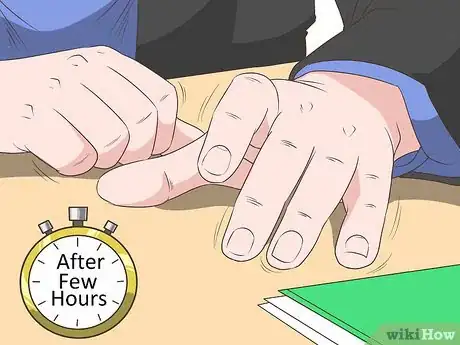


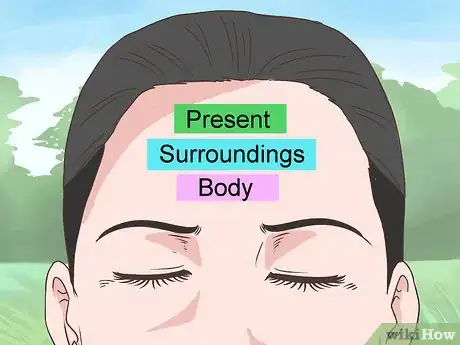
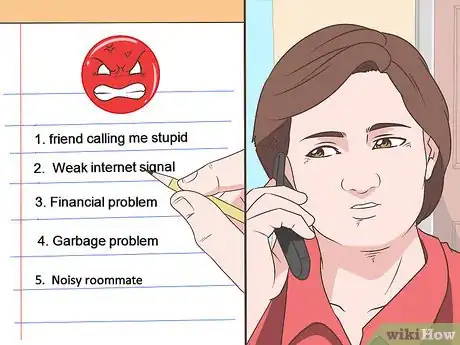


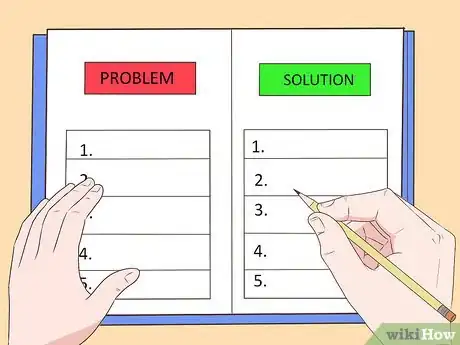




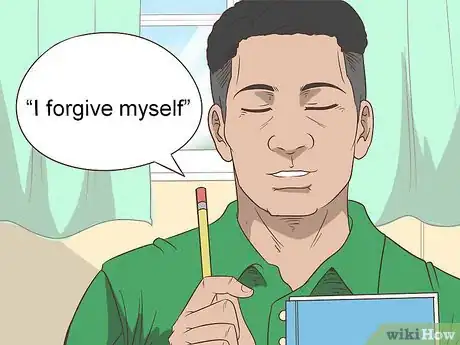
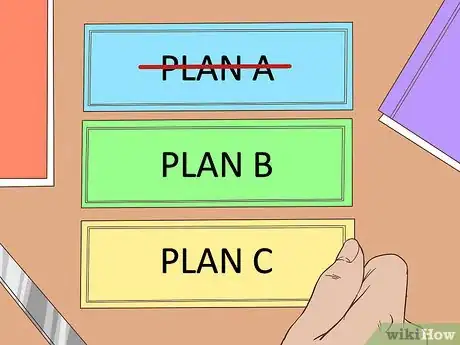




























































Medical Disclaimer
The content of this article is not intended to be a substitute for professional medical advice, examination, diagnosis, or treatment. You should always contact your doctor or other qualified healthcare professional before starting, changing, or stopping any kind of health treatment.
Read More...